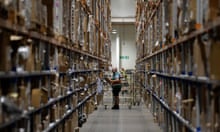Amazon, Deliveroo and Uber have admitted their businesses would remain viable if they were no longer allowed to rely on self-employed workers who do not receive sick pay, pensions or a guaranteed minimum wage.
Senior executives working for the three firms, as well as the delivery company Hermes, told MPs that a change in the law being considered by the government to give more workers in the so-called gig economy basic employment protections would not force their businesses to close.
The admission was made to the House of Commons work and pensions committee, which is chaired by the Labour MP Frank Field, during a 90-minute hearing in which senior MPs strongly criticised the companies for using self-employed workers to avoid significant costs including national insurance and pensions contributions.
The Conservative MP Heidi Allen demanded to know: “When are you going to start paying people properly?” And Field told the bosses: “You are asking people to commit to your companies but you are not committing to them in terms of sick pay, and other things. You are pushing the boundary here.”
The Tory MP James Cartlidge said that given the cost of pensions and benefits to the taxpayer, “the more that people are in this pseudo-employment, the more we all feel that the state is picking up the bill”.
Dan Warne, the managing director of Deliveroo, which uses 15,000 riders to deliver from restaurants and takeaways, defended the practice.
“We adopt a highly flexible model with all those riders, which is the reason why we have self-employment,” he said. “With our fee-per-delivery model, riders are paid for each delivery they do, and they are allowed to log in whenever they like, for whatever duration they like while at the same time working for other companies.”
But the exchequer is facing a £6bn shortfall in national insurance revenue by the beginning of the next decade as a result of the rapid growth of self-employment in the UK – up by about 1 million people since 2009, the Resolution Foundation thinktank said earlier this week. Theresa May has ordered a review of the trend, which is expected to lead to recommendations for the law to be changed. Several employment tribunal cases have ruled that gig economy workers, including for Uber, should not be classed as self-employed contractors.
The Resolution Foundation calculated that 40% of the growth in UK self-employment since 2009 was in more “precarious” sectors, such as construction and cleaning, and earnings from self-employment had fallen from more than £300 to below £250 a week during the last decade.
By contrast, the percentage of self-employed in the workforces of the US, Germany, Japan and Italy is falling.
The four giant gig-economy companies together use tens of thousands of self-employed staff, many in effect working full-time, but told MPs that self-employment gave workers flexibility they valued highly.
However, when asked by the Labour MP Steve McCabe if they would have to shut if they could not use so many self-employed workers, Warne said Deliveroo “would not close down”.
“We would continue to operate as a business,” said Carole Woodhead, the chief executive of Hermes, which uses 10,000 self-employed couriers. She said the company would probably begin using a smaller number of full-time workers.
Lesley Smith, Amazon’s director of public policy in the UK and Ireland, and Andrew Byrne, Uber’s head of public policy in the UK and Ireland, also confirmed their businesses would remain viable.
The MPs’ cross-examination came amid growing pressure on the gig economy companies. Woodhead revealed that officials from Revenue & Customs gathered evidence from Hermes in December about its employment model and pay, which is part of an investigation triggered by a Guardian exposé last July that earnings among some Hermes couriers were below the national minimum wage.
Uber lost an employment tribunal case that ruled that self-employed drivers should be considered workers and so receive the guaranteed minimum wage. Deliveroo was revealed to have included a clause in its contracts with riders that prohibits them from challenging their self-employed status in the courts.
Pressed on this by Allen, Warne said this would be removed from contracts in the coming weeks. “There is no need to have it there,” Warne said.









Comments (…)
Sign in or create your Guardian account to join the discussion